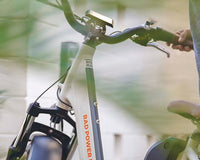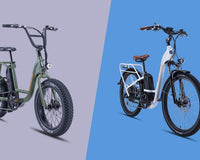Human beings are mobile creatures. Whether it’s heading across town to tackle errands or blowing off steam by getting outside for a change of scenery, everybody needs a way to get around.
But sometimes, traditional forms of transportation just aren’t accessible for everybody, and that’s where electric bikes rise above the fray.
As we focus on inclusion in mobility throughout February, we wanted to highlight Dr. Christopher Royer, a neuropsychologist who reclaimed his mobility with the help of a RadRunner electric utility bike.
Royer was born with blue cone monochromacy, a rare genetic condition that affects how he perceives color and restricts his long-distance vision.
For the most part, he says, it doesn’t present too many challenges. He’s still able to meet with patients and can move through the streets of Mechanicsburg, Pennsylvania, without issue. Occasionally, he’ll get mildly frustrated by the little things, like going to the grocery store and not being able to read the words on aisle signs.
For years, however, it did present one major hurdle: It stopped him from getting a driver’s license.
“I see perfectly well enough to walk on the sidewalk and navigate obstacles, but I don't meet the criteria to drive,” he explained. “It’s hard for me to see at a distance and when it comes to color vision, I have a hard time with brake lights.”
As a result, Royer used to hoof it to work and back on foot or rely on his wife to drive him around town. But he was looking for something that could help him get around a little easier.
He found his solution in the fall of 2019, when he bought his first electric bike.
“It’s been a really great thing for my life and my family,” he told us. “It’s made a huge difference.”
Now, not only can Royer make last-minute trips to the store or start his commute a little later, but tasks like visiting his 89 year-old mother have become a lot easier.
“She lives a few miles away, so if I wanted to check in on her, I’d have to walk about 30 minutes,” he said. “Now, if she needs something, I don’t have to bother my wife and I can get down there in a fraction of the time.”

While cycling with vision issues may raise some immediate questions, it’s not as uncommon as you might think. Academic research published in 2020 found that these riders often make responsible decisions to help compensate for their limitations, like choosing less-trafficked routes or riding in the center of the lane.
For Royer, he has the benefit of riding in a small town filled with familiar routes that let him plan ahead.
“I wouldn’t go down the shoulder of the highway or do anything where I’d have any doubt, but I've lived in this town for 22 years,” he said. “I know the streets and have never had any accidents or close calls.”
He also takes additional steps for added safety. Since he can be sensitive to bright light, for instance, he’ll tuck a baseball cap under his helmet and bring sunglasses.
As for the bike itself, Royer has found plenty of reasons to fall in love with it, and not just for the way it’s changed how he gets around. He’s tried traditional bikes off and on throughout the years, but wasn’t a fan of the maintenance they required. Having a single-speed bike that's equipped to take on big hills helped on that front.
“I’m not super handy, so bikes with derailleurs and multiple gears didn’t do it for me."
The fact that it’s electric, he added, was also a big plus.
“I'm 55 now and I’m not in what I would say is the best shape,” he chuckled. “I’d walk everywhere, so I have pretty good endurance, but it’s great having something that makes it a lot easier on the knees. That was really an important point for me deciding to get it.”
To that end, he’s been recommending it to scores of folks he’s known who’ve had knee replacements or other situations that would make an ebike more appealing.
For those with vision conditions, however, he acknowledges that it boils down to their individual situations.
“Visual impairments are so different for each person,” he noted. “I would highly recommend this bike, but I would also recommend that they test one first and talk to their health care provider before making the commitment. Just to make sure everything is safe.”
One person he hasn’t shied away from talking up the bike to? His wife. According to him, she'll likely get one in forest green.
“Hey, I’m color blind, so of course I have mine in black,” he joked. “I’m sure it’d be nice to get some variety.”
Rad Power Bikes was built on making transportation accessible for all, and stories like Dr. Royer’s remind why that’s so important. If you’ve used our ebikes to reclaim your mobility, we want to hear about it. Share your experience on social media and tag us!
Curious if an electric bike is right for you? Try one for yourself! Find a test ride location near you.








